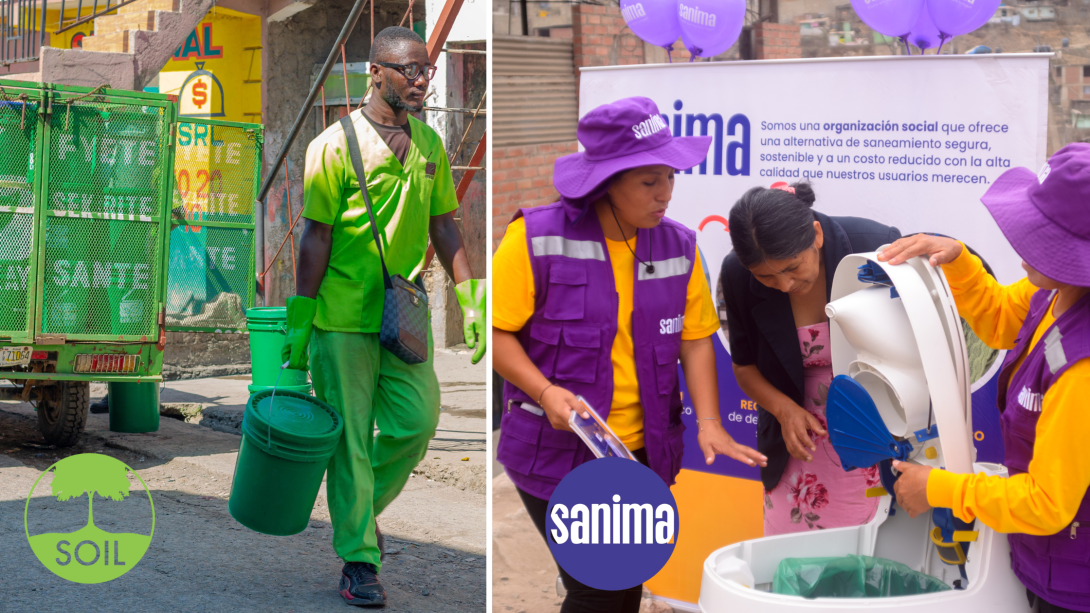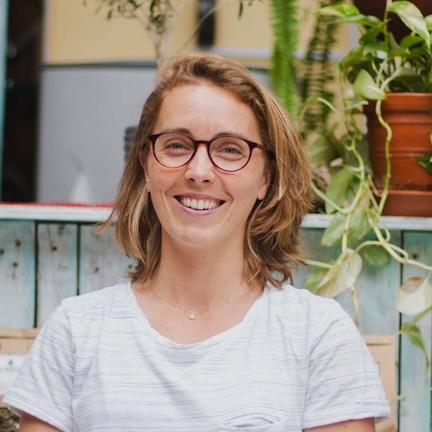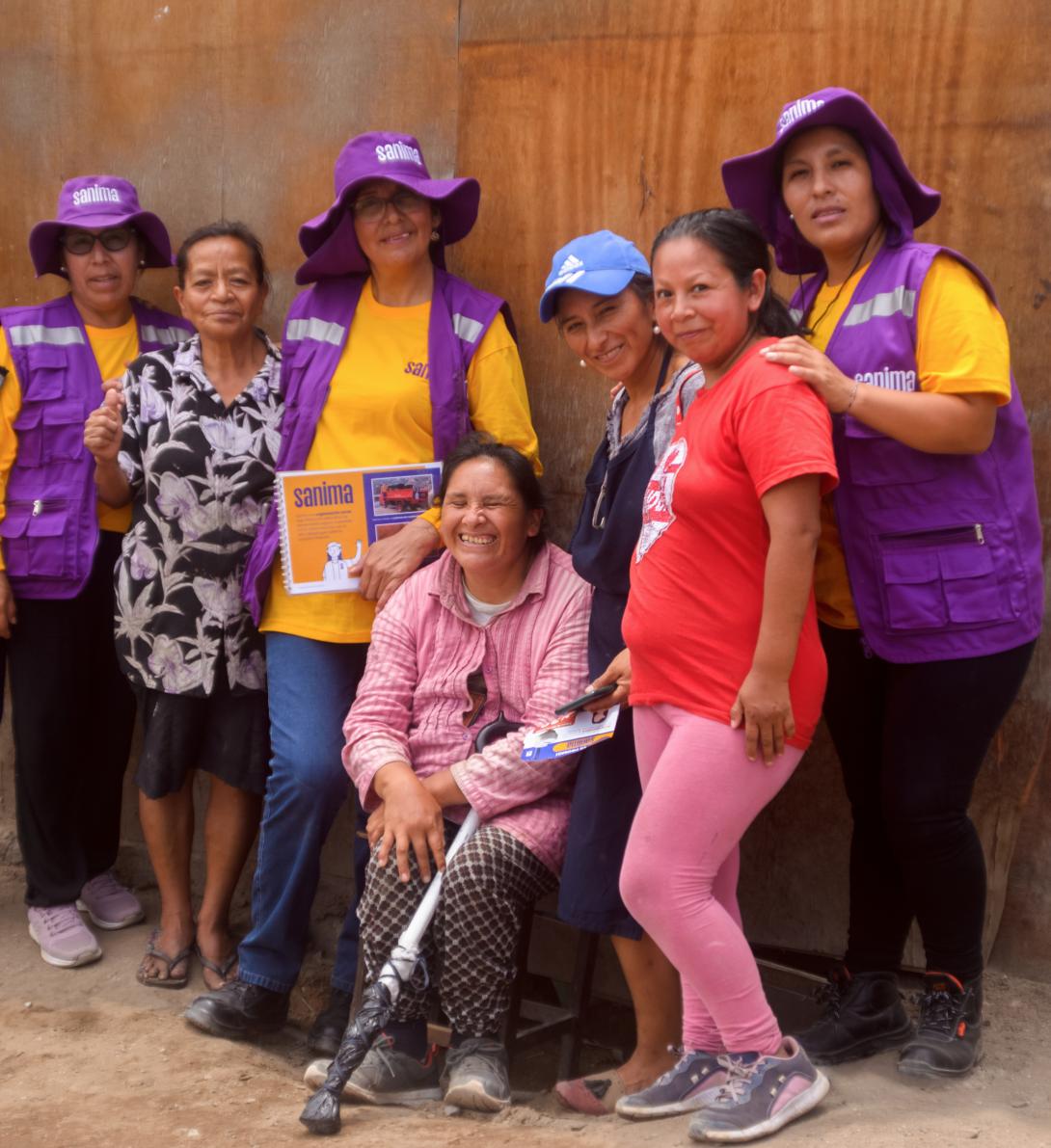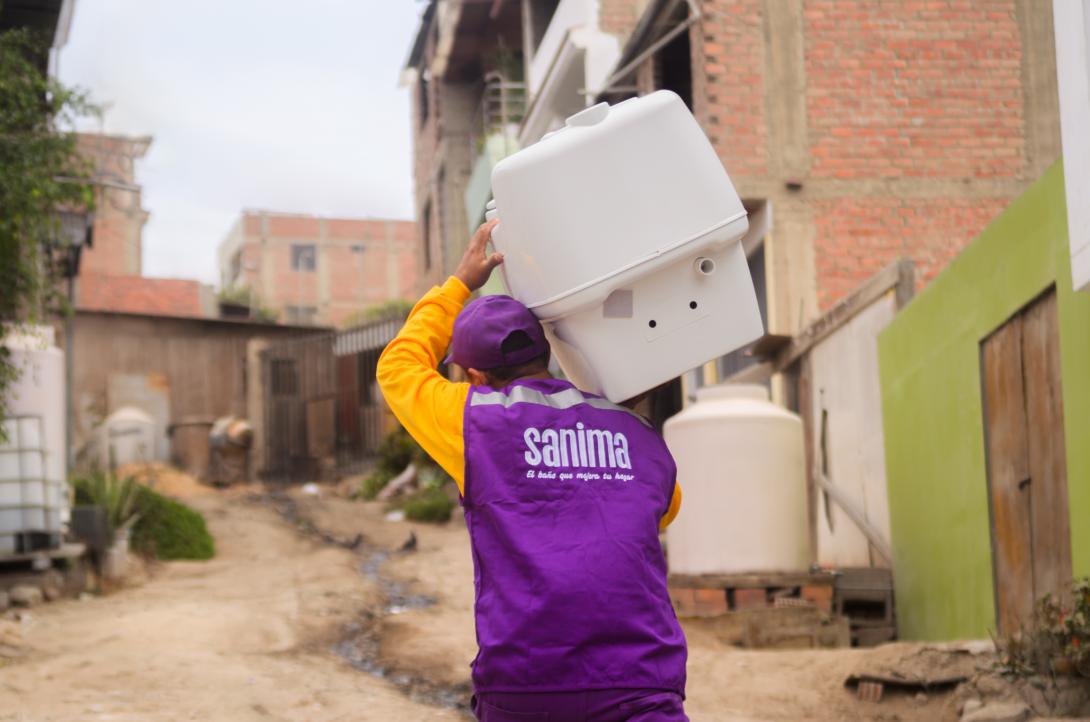Sanitation Soulmates: The Story of Sanima and SOIL

Left: SOIL Haiti, Sanitation worker on a collection run. Right: Sanima Peru, Sanitation Workers showcasing the function of Sanima's toilets.
This World Toilet Day, we’re excited to spotlight Sanima, an organizational partner that’s near and dear to SOIL’s heart. Based in Lima, Peru, Sanima provides container-based sanitation services to urban communities and informal settlements. For over a decade, SOIL and Sanima have worked together to bring the vision of safe, sustainable sanitation to low-resource areas through container-based toilets. While SOIL operates in Haiti and Sanima in Peru, we’ve always felt that our friends in Lima just get what it means to do safe sanitation right.
The Start of Sanima

For Isabel Medem, Co-founder of Sanima, the company’s founding was unexpected, almost serendipitous. She didn’t have any background in sanitation or engineering or environmental studies.
What she did have was a masters degree in business and interest in addressing deep rooted inequities. During Isabel’s studies she dove into the concept of the “bottom of the pyramid,” seeing low-resource communities as underserved markets with potential. This took her across continents, working with NGOs, microfinance groups—you name it. But it didn’t steer her into a classic development career; instead, it stirred up questions.
Was the aid model truly working? Could people on the ground actually get what they needed?
Isabel observed a power imbalance in the field—the kind that happens when organizations that label themselves as “aid” or “development agencies” arrive with pre-packaged solutions rather than addressing communities’ real needs.
“I felt like so much was lost in translation,” she recalls, “When I talked to people who were receivers of aid they often said that their needs weren’t being met.”
Then, back in Berlin, a conversation with a friend changed everything. Her friend’s idea of working in sanitation initially struck her as, well, boring. But as they flushed out the concept, Isabel’s ambition sparked. Here was a chance to tackle sanitation, sidestep the bureaucracy, and offer a service directly to people—one that customers could critique to ensure it improved their lives. And thus, the seed for Sanima was planted.
Sanima started as “XRunner” with a clear mission: address a core problem people in poverty face and do it with integrity and pride. It was vital to Isabel that customers had the freedom to give honest feedback. After all, a service only works if it’s truly helpful.
Arturo’s Path to Sanima
Arturo Llaxacondor, now Sanima’s CEO, was born and raised in Lima. Arturo hadn’t planned to work in sanitation nor did he have experience in working with informal settlements. But he’d learned about different social enterprises during college, and after discovering XRunner (Sanima), he joined the team in 2018 as a customer support lead. The rest is history.
“What kept me at Sanima was the honesty—not just the technology, though that’s exciting too—but the raw, critical approach to what we do”.
Meeting a Sanitation Soulmate
In 2016, when Isabel first met Sasha Kramer, SOIL’s Co-founder and Executive Director, she knew that she had met a kindred spirit in the sanitation world. SOIL was already working on research regarding sanitation in urban communities, and talking to Sasha was a breath of fresh air. It wasn’t about bragging or business plans but about having real conversations about human challenges faced by real people.
“When I first met Isabel, riding around Chennai in a tuk tuk, I remember thinking—this woman is incredible,” Sasha recalls. “Sanima has always been a source of inspiration for me—they’ve drawn so many exceptionally talented and dedicated people to their team. And Arturo? I don’t think there are enough words to describe his brilliance.”
This partnership traces back to Stanford graduate student (and current SOIL Advisory Board Member), Kory Russel, whose work connected SOIL and Sanima. Through a Gates Foundation grant, Kory helped design the EkoLakay toilet. During that same time Kory was collaborating with Sanima in Peru, and introduced Sasha to their work.
Naturally, as Sanima grew connections among other sanitation pioneers, a network of organizations with shared goals formed and the Container Based Sanitation Alliance was born. Composed of 15 member organizations across 13 countries, this alliance advocates for the advancement of container based sanitation and its implementation as a cost-effective and impactful sanitation solution globally.
SOIL has continually worked with Sanima to relay ideas, collaborate on research, and consult one another on best practices. In 2023, SOIL’s Chief Operating Officer Nick Preneta and Research Consultant Maya Lubeck-Schriker visited Sanima’s team in Peru to work with fellow researchers on the Off-Grid Cities Project tracking the expansion of off-grid sanitation services in the form of container-based sanitation across 4 countries: Haiti, Peru, South Africa, and Kenya.
Arturo sees SOIL as a true companion, with both organizations facing similar hurdles with empathy and passion. “It’s nice to have a partner in the sector that shares the same perspective and the same respect for those we serve,” he says, “As members of the Container-Based Sanitation Alliance we see ourselves not as individual providers but partners in a growing sector of container-based sanitation”.
Lima’s Sanitation Challenge
As Arturo explains, Lima’s population has nearly doubled since 2000, surging to over 11 million people. The city’s growth has created a dense and underserved urban sprawl, where access to basic services like water and sanitation is a persistent issue. “There’s a line between areas where water is available and where it’s not,” Arturo explains. “And that line speaks to a history of social, political, and economic factors rooted in conflict and colonialism.”
During colonial times, Peru’s coastal region was designated as the economic hub, despite having the least amount of clean water available in the country. This historical precedent has concentrated money and opportunities in Lima, attracting people from economically struggling regions who are in search of safety and employment. However, the private sector has not kept pace with the population’s needs, and investment in housing and infrastructure has lagged.
“There are people who talk about migration from rural areas as an invasion,” Arturo explains. “But people are simply seeking a place where their basic rights can be met.”
These conditions have led to informal settlements that don’t have basic sanitation or sewer systems. This lack of access also comes with mental challenges, as families rely on makeshift and unsafe pit latrines that run the risk of collapse or sinking. They have to worry about their safety and health every time they use the toilet.
The Peruvian government has proposed expanding sewer systems to cover these underserved areas in Lima, but building a conventional sewage infrastructure could take up to 14 years. In the meantime, Sanima offers an immediate and innovative solution for its customers: safe, dry, and dignified sanitation that does not rely on complex infrastructure. “The changes a household can experience with the Sanima service are transformative, they speak for themselves,” Arturo says.
Isabel emphasizes the importance of Arturo’s contextual explanation for why human settlements are being formed in urban areas, “When presenting at international conferences, we’re asked to simplify the problem. But without context, you miss the nuances and risk reducing complex lives to stereotypes”. For her, Sanima isn’t just about “clean toilets”—it’s about restoring dignity and fundamental rights. Lack of access to adequate housing is just one symptom of the much larger issue of poverty and inequity.
Real Stories from Real People
Arturo recalled a visit he just did before this interview to a household in Sanima’s service area.
“I was walking around today, speaking with families, and one mother told me about her child with autism. She explained how, with Sanima’s in-home toilet, her son is now more autonomous and can go to the bathroom safely. For her, it meant peace of mind and having more time to focus on her son’s development. And that really touched me. Her words held a sense of relief– tranquility that comes with having a safe, private toilet and being able to provide for your child. ”
What’s the connection between toilets and gender?

Beyond safety, Sanima’s toilets help prevent urinary tract infections and other health issues that come from using pit latrines, which are often located outdoors and hard to access at night. Arturo provides anecdotal experience on women in Sanima’s service area having reported going to the hospital several times a week to get medicine for UTIs. These same women noted that they had less frequent infections when using Sanima’s in home toilets.
“I wish we had more hard data on this, but what these testimonials tell me is that there are some health issues, more specifically affecting women, that are somewhat alleviated by access to Sanima’s toilets” Arturo says.
A Vision for the Future
Looking ahead, Sanima dreams of a future where their services aren’t needed because the government has fully embraced and integrated container-based sanitation. “Ideally, Sanima would no longer exist because the government would create systems like ours for everyone,” Arturo says.
Celebrate World Toilet Day

To celebrate World Toilet Day, Sanima invites the global community to see safe sanitation not as an isolated problem but as part of a broader issue of inequality. Sanitation is not only a matter of concern for people who do not have access, but as a species, as a society, and as a global community, it is something that should be compelling to everyone. As COVID-19 made very clear to the world, we are not separate, and if we want to take care of ourselves, we must also take care of one another.
Access to a toilet is just one piece of a much larger puzzle that includes adequate housing, safe neighborhoods, and basic infrastructure. For those of us that have the luxury of reading about World Toilet Day, today is a good opportunity to consider the privileges that come with living in a neighborhood that has paved roads, trash trucks, sewer systems, tap water, and all of the many other available conveniences that we may not think about on a day to day basis.
SOIL is grateful to Sanima for being an ally in the sanitation sector and sitting down with us to reflect on our longstanding friendship and partnership. Together, we look forward to continuing to push forward innovation and find improved sanitation solutions.
Learn more about Sanima’s work in Peru.
Learn more about the Container Based Sanitation Alliance.